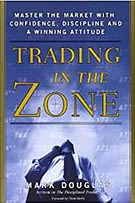Many inexperienced Betfair traders lose because they are not psychologically prepared to trade.
Think about it... all football trading strategies require you to risk your hard-earned money on something which you have no control over... and it's tough when things don't go to plan.
If you place your first bet today, I guarantee it won't take very long before a missed penalty costs you a potential profit. Or, perhaps, the team you back will have a man sent off and lose the match.
It's very annoying, but that's football and your mindset will determine whether you make good or bad decisions; whether you win or lose.
For example, I know that a lot of people reading this are already thinking about clicking on something else. Trading psychology is not the most exciting topic but, if you really want to make money on Betfair, then you will take it all on board.
So here's your first decision... do you want success badly enough to read all the way to the bottom of this page?
Why is Trading Psychology Important?
Trading psychology - your mindset - will largely determine how successful you become. You can have the best Betfair trading strategies in the world but, if you can't stay in control, then you're going to struggle to hold onto your profits.
You would not believe the number of members who email me to say that they make fantastic profits from Goal Profits strategies, but then make bigger losses from in-play trading when bored. It's complete madness, but very common.
When you're logged in to Betfair, you're going to be in a constant battle with temptation. You must win that battle!
Here's a famous quote from legendary investor Warren Buffett...
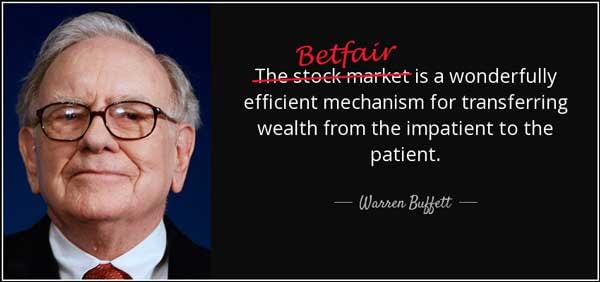
Ok... so I may have edited it slightly, but it's absolutely true. If you're not going to patiently wait for the right trading opportunities, then you're simply going to give your money to a trader who does. Trade smart!
Football Trading in the Real World

The secret to successful football trading is very simple... do what works and don't do what doesn't. Pretty obvious, right? So how come everyone doesn't just do that and make a living from trading?
The answer... mindset.
Far too many people want instant success. They want to start banking profits right away, watch their Betfair balance grow, give up work within a matter of weeks and spend all day watching football.
That's a great dream... but do you really think that the real world is like that?! If it was, then everyone would do it and offices on Monday would be full of empty desks!
Betfair is full of very clever traders whose sole intention is to take your money. They don't care if it leaves you broke, they just want your money in their account. They're ruthless and that's why so many people lose money. In order to make a profit, you need to trade smarter.
Are you going to be an experienced and skilful trader by next month? Probably not, but there's no reason why you can't be a better trader than you are now. You can improve again the month after and then the month after that too. In time, you do become an experienced and skilful trader.
Can you go on a one day Betfair trading course and then start trading successfully right away? Almost certainly not, but it won't stop people promising that it's possible - then charging you a lot of money just to find out the hard way.
Football trading is an art form that has to be nurtured. It takes time but, like anything else that is worth waiting for, the benefits of getting it right are fantastic! Learn your trading skills, gain experience and protect your bank by making rookie errors with small stakes.
If you attempt to start banking big profits right away you will put unnecessary pressure on yourself, get involved with poor trades and chase losses. You are never going to run out of fixtures to trade, so what's the rush?
What are Your Profit Expectations?

Most people enter the world of football trading for a bit of fun or to make some profit.
If you trade here and there for a few quid, you don't really have to worry about whether you win or lose. You know that the worst that could happen is you lose a small amount of money and you will come to no harm.
However, as you look around the internet you may end up on one of the flashy tipster sites. You start reading the sales page and maybe see a sports car parked in the drive of a mansion house.
This does exactly what it is meant to do.
It raises your expectations to such a level that you want to join that tipster's site immediately. You want a sports car so badly and the mansion house would be very nice too (I bet it's got a swimming pool as well, but that will be round the back).
So now you're all of a flutter, wanting to get started betting on the tips you get.
You make some money in the first week. Perhaps you've found the Holy Grail!
You feel infallible and so the following week you put larger stakes on.
"That way I will make more money quicker, can't wait!"
"Oops, how did that happen? He's had a loser. Oh well, I am sure it will be only the one."
"No it's not... he has had three losers on the trot in one day and I have been putting big money on them."
"What I made last week has disappeared in just one day."
One bad day may not put a member off a tipster or Betfair trading system, but one bad week may. A bad month almost certainly would.
Is that fair though? When you first saw that site what were your expectations?
Yes you saw the house and the car and no doubt your expectations soared. But did you actually put a figure on them, or did you just think "this time next week I will be a millionaire"?
Yes, it is nice to have expectations, but it is necessary to keep them to a realistic level.
If you start trading with a bank of £1,000, don’t expect it to be £5,000 by the end of the first month. That's never been done in the history of the world and never will be.
An experienced trader will often expect to make a 10% increase on their bank per month.
A competent trader will have good days making 3/4/5% but these days will be rare and cannot be sustained over a long period as the risks are simply too high. What the good days do, though, is make up for the days when there's not a profit to be had.
If you're just starting out and you can get through your first year with any sort of profit, you will have done very well and stand a very good chance of being a successful trader long-term. Whether you are in profit or not at the end of your first month is completely irrelevant.
Aim for Realistic Bank Growth
Breaking it down one day at a time, if you are aiming for 10% bank growth in a month then you are looking for just 0.3% per day.
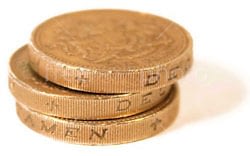
If you have a bank of £1,000, that's a profit of just £3 on the first day.
You need to think about that.
If you think £3 profit from a bank of £1,000 is not much on day one, your expectations are far too high.
The chances are that you will lose your bank at some point in the coming months because you will take too many risks by:
All of these will catch you out at some point, but if you accept that 0.3% per day is a good return, then you will be rewarded.
Put it this way... if you have a bank of £1,000 and you go with a target of 0.3% per day - compounding as you go - at the end of the year your bank will have trebled to £3,000. An outstanding achievement!
You need to use your bank as an investment tool. The increases will be small to start with but as your bank grows, so does the possibility of it gaining speed due to the compounding effect.
Greed is the trigger that gets your expectation levels to sky rocket and in the end it is greed that will kill your bank. You will over expose it with staking ratios that are far too high for the capital you have available.
Modify your expectations and the pressures on you will reduce. Your bank will develop at a sustainable level which may not seem great to start with, but at just 0.3% per day that £1,000 would be £250,000 in five years time.
You'd be happy with that, right?
Betting bank management is an essential part of professional football trading. Here’s how to secure your hard-earned money, then grow it safely over time.
Learn Before You Earn
When you first start trading on Betfair, it's really exciting! It's also excruciatingly difficult.
Trading is all about making enough good decisions to see you profitable in the long term. You work in the Betfair markets and you need to know everything about them in order to outsmart other traders.
I know that you're itching to get going, but would you drive a car without a few months learning how to drive first? Of course you wouldn’t, though virtually everyone gets straight into trading without knowing the first thing about it.
Kevin Laverick is the best Betfair trader I have ever come across, but when he first started trading he lost £40,000. He has since got it back (and plenty more on top) but it was a harsh introduction to trading on the exchanges.
Kevin once said that the most frequent question he's asked is, "what do I do to get started?"
And that the very best answer he could give is, "do nothing".
That may seem strange but, given everything Kevin went through when he started trading, it does make some sense. After all, if there's no money at risk then there can be no money lost.
Spending time just watching the markets gives you a much better understanding of how they work, how they are all inter-related and which markets you can play off against each other.
Do that and I can guarantee you will be far better equipped to make a success of it. Also, you won't have lost a penny in the meantime!
I know it is not what newbies want to hear, but learn before you earn.

Kevin Laverick
Football Trader
The smartest thing I ever did was to take a year out from my trading and spend that time just watching the markets. Seeing how and when the odds move put me in a much better position for making sound decisions - and the rest is history.
Think Like a Professional Betfair Trader
Professional traders think differently from most other traders.
I hear from a lot of Goal Profits members who say they have been doing really well, have had a fantastic week, made lots of profit and then lost it all in one bad day. Has that ever happened to you?
If it hasn’t then you are a rare exception, because to be honest it happened to me so often in my early days.
So why is it that this happens to people? Why do they win for a few days/weeks and then lose it all in one bad day?
Is it bad luck? Bad match selection? Bad strategy selection?
Of course it may be a combination of all of those, or it may be nothing to do with any of them.
I believe that it's down to their mindset.
Inexperienced Trader
Hopefully, even an inexperienced trader will understand that it's impossible to avoid losses. They know they are going to have bad days so, to nullify the effect of those, they think they have to make profit first.
By putting pressure on themselves to make instant profit, they push things harder than is necessary. For example, they may trade at larger stakes than their bank can handle or they may stay in a trade far too long.
This may help in the short term and that is where the good week comes in. They have defied convention, but got away with it and made a tidy profit too.
A new week arrives and they feel unbeatable. Bad mistake!
They have a bad start to the day, then chase loss after loss to end in crisis.
Their sequence may be WIN-WIN-WIN-WIN-WIN-WIN-WIN-BIG LOSS and overall, they have lost 20% of their bank.
Professional Trader
The professionals are different from most punters and don’t put pressure on themselves.
For example, I consider "scratch" - a trade without a profit or a loss - to be a success. On my profit and loss account, scratch trades are shown as green figures as I have won my stake back to finish level.
Scratch is green, green is a profit and therefore my scratch trade was a positive event. All part of the mindset.
I can go a whole week, win absolutely nothing but still feel as though I have won. My P&L is full of green figures and I know for a fact that if I can keep hitting scratch trades, then sooner or later I will hit a big winner.
My sequence could be SCRATCH-SCRATCH-SCRATCH-SCRATCH-SCRATCH-SCRATCH-SCRATCH-BIG WINNER with the result being a 10% increase on my bank.
Never worry about having a week of scratch trades, it only means you are close to a big winner.
Whenever I enter a trade, my initial aim is to make scratch. Anything better than that is great, but for me a scratch is great too!
Here is your complete guide to trading football for a living. Plan your journey from betting beginner to professional Betfair trader and then make it happen!
Fear of Missing Out (FOMO)
This is a nightmare... the worst form of temptation and you have to be ready for it!
Yes... "fear of missing out".
There's going to be a time when you have a trade identified, but a goal is scored just as you're about to enter your position. It might even happen a second time, then FOMO is going to appear in the back of your mind.
As your prepare to enter your next trade, you remember the times when goals snatched those winners away from you. You were so hard done by! Not this time though... you get in nice and early. Sure, the liability is a bit higher but you won't miss out on that winner!
Except this one goes on to lose... and the loss is more than it should have been.
What now?
Right... I need another trade to get back that mistake. Hmm... Portuguese Segunda... that'll do.
You can see where this is going... poor decisions and chasing losses never ends well.
This is what you have to remember every time you "miss out" on a winner.... if the trade was strong enough, then you'd have already been in it. It wasn't strong enough, so you weren't in it and you missed out on nothing.

Dealing With Losses
The first thing to say is that losses are all part of the game.
Just the same as every football team loses, you will also lose many trades.
However, learning how to cope with those losses will help your profit and loss account enormously. Unfortunately, lots of people find it an unacceptable part of trading; they simply cannot handle losses and are doomed to fail.
Consider this... if you back at 2.00 or lay at 2.00, the market is telling you that you have a 50% probability of winning, so right away you can expect to lose half your trades. If you have 100 trades at 2.00 and you manage to win 60% of them, you will make a profit overall. However, you will also have 40 losses.
But here's the kicker... if you have 60 winning trades and 40 losing trades, they will not be evenly distributed. You may well start with 5 winners, but you could just as easily come up with 5 losses - ouch!
How are you going to react when you hit a few losses in a row?
Will you have the faith and confidence that you're doing the right thing and it's just a bad run? Or will you rip up a strategy which is profitable long-term and miss the correction to the upside?
Dealing with losses gets much easier with experience. In time, you will go into a trade knowing that it may win or lose but that at the end of the day, it's just another trade on your way to a long-term profit.
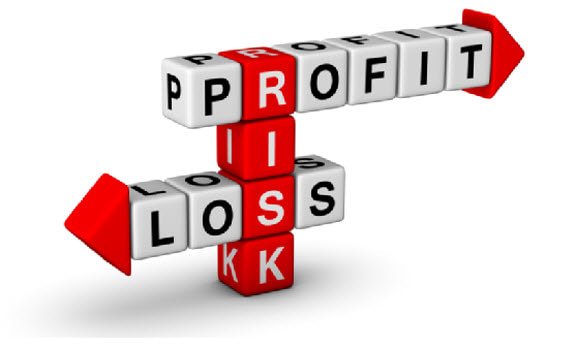
Positive Mental Attitude (PMA)
Positive mental attitude (PMA) is vital for anyone wanting to become a successful trader. If you're full of doom and gloom after a loss, it's going to be so much harder to achieve your goals. Keep the positivy flowing!
Professional traders see losses as nothing more than learning opportunities to improve. See how positive that is?
Imagine how much less a loss hurts once you learn something from it... something which is going to reduce future losses or, perhaps, avoid some of them completely.
- Winning traders have a positive psychological mindset where all they see are opportunities
- Losing traders have a negative psychological mindset where all they see are problems
There's something positive in literally everything you do - good and bad - so focus on that and your trading psychology will become closer to that of a professional trader.
Take Responsibility for Your Losses
When you hit a loss - or a series of losses - the easiest thing to do is find someone else to blame.
Rather than point the finger of blame at yourself, it's far easier to blame the rubbish team which just cost you a packet or the referee who didn't give the most blatant penalty in the history of football.
It's even easier to blame Steve and Kevin at Goal Profits and their trading strategy!
But here's the thing... unless you stop playing the blame game, you will forever be a losing trader.
If something is going wrong and you convince yourself that someone else is to blame, then you will never take action. You will never fix the problem and turn your fortunes around.
Over the years, I have received emails from frustrated members who lash out in frustration because they have lost money. They try to make the case that it's definitely not their fault, despite many other members doing well and growing their banks steadily by using the exact same trading tools and strategies.
Hmm... whatever could be the difference?!
The bottom line is this. Every trader has losses, but losing does not make you a loser - it makes you a trader. The best traders in the world lose many of their trades, but what they do is to handle them so much better.
Don't focus on winning and losing, focus on your trading plan and stick to it.

How to Handle Losing Runs
Every trader has losing runs, even the most skilled traders have them. I certainly have them - probably more than most - and they're a nightmare, turning the calmest of people into quivering wrecks.
From time to time, we have all wondered, "when will the next winner come?"
It seems the harder you try, the unluckier you get. Nothing goes right and even your faithful dog has turned his back on you.
Ok... that won’t happen, but you know what I mean!
Losing runs wouldn’t be at all bad if you knew where the next winner was coming from. You have come into this sports trading game and expected it to be easy peasy, but a losing run really tests you.
So, how do you handle losing runs?
Here are 5 rules to help you survive losing runs and come out the other side with your bank in one piece:
1
Be Prepared
Losing runs are not going away, so train your mind to accept them. Be prepared, because losing runs can happen at any given moment. When you have had a good run, accept that a bad run may be just round the corner.
2
Identify a Losing Run
Understand when you are in a bad run. If you are backing at big odds, you would not be worried about 4 or 5 losers on the trot (that would be normal) but if you are an odds-on backer then 4 or 5 losers on the spin would be unusual.
You yourself will be the judge of when a losing run really is a "losing run" or when it is just the normal course of events.
With experience you will be able to identify losing runs quickly and use smaller stakes right away which will save some of your bank.
3
Keep Records
Keeping records of all your trades is going to help you by determining what exactly a losing run is for you. It will also alert you as to when a losing run is likely to start and/or finish.
I know it is a bind having to write them up every night, but it will be time well spent in the long run and gives you a great handle on your trading style. From your records you will be able to analyse which particular bets are causing problems and which are not.
4
Find the Problem
It may be that your losing run is simply down to bad luck, but don’t rely on that.
You have your profit and loss record which will help you find what's going wrong. Maybe longshot away wins are not coming in and you have been backing too many of them, or goals are currently in short supply and all your bets have been aimed at plenty of goals.
You have everything you need to find the problem.
5
Be Disciplined
Throwing your money around and chasing losses can only ever end up one way (and it is not pretty). Stay in control of your discipline and consider your options in a rational way.
If you have worked out that you are purely having a run of bad luck, that will change. However, if you have identified a flaw in your trading regime then you need to fix it before you re-start. That may mean ditching a system, or looking to back at lower odds.
One good option is to take a complete break for a week and that will often do the trick.
Losing runs are annoying, but inevitable and they will not go on forever. Make sure you:
Protecting your bank is paramount, after all you can't trade at all without one!
Trading Psychology Books
The best trading psychology books are centred around the stock market rather than Betfair trading. The principles are the same for sports trading though, so don't be put off by that. After all, trading psychology is the same whether you're logging into a betting exchange each day or a financial trading platform.
With such growth in the betting exchange space over the past few years, I'm surprised that there are no Betfair trading books which cover trading psychology at anything more than a basic level. Financial trading has had hundreds of years of a headstart though!
Here are a few of the best trading books to read if you're interested in working on your own trading psychology - and you should be!
Trade Your Way to Financial Freedom
by Van K. Tharp
"Tharp explains that the Holy Grail in the market is different for each trader; one that can be uncovered quickly and plugged into every trading program with surprisingly little effort. He shows how the interplay of your style, goals and personality - in combination with a carefully designed and tested system - will ultimately determine your success."
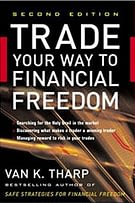
Trading For a Living
by Dr Alexander Elder
"Why teach? Why not simply stay in front of the screen and quietly grind out profits? Whenever I hear this question, I say: "Preaching is good for the preacher". Showing specific chart patterns and stressing the need for discipline reinforces my own performance. To master a concept you have to be able to teach it to others. If you can′t explain what you think you know, then you really don′t know it."
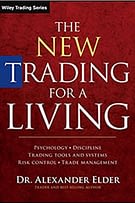
Trading in the Zone
by Mark Douglas
"Douglas uncovers the underlying reasons for lack of consistency and helps traders overcome the ingrained mental habits that cost them money. He takes on the myths of the market and exposes them one by one teaching traders to look beyond random outcomes, to understand the true realities of risk, and to be comfortable with the "probabilities" of market movement that governs all market speculation."
